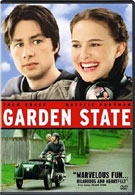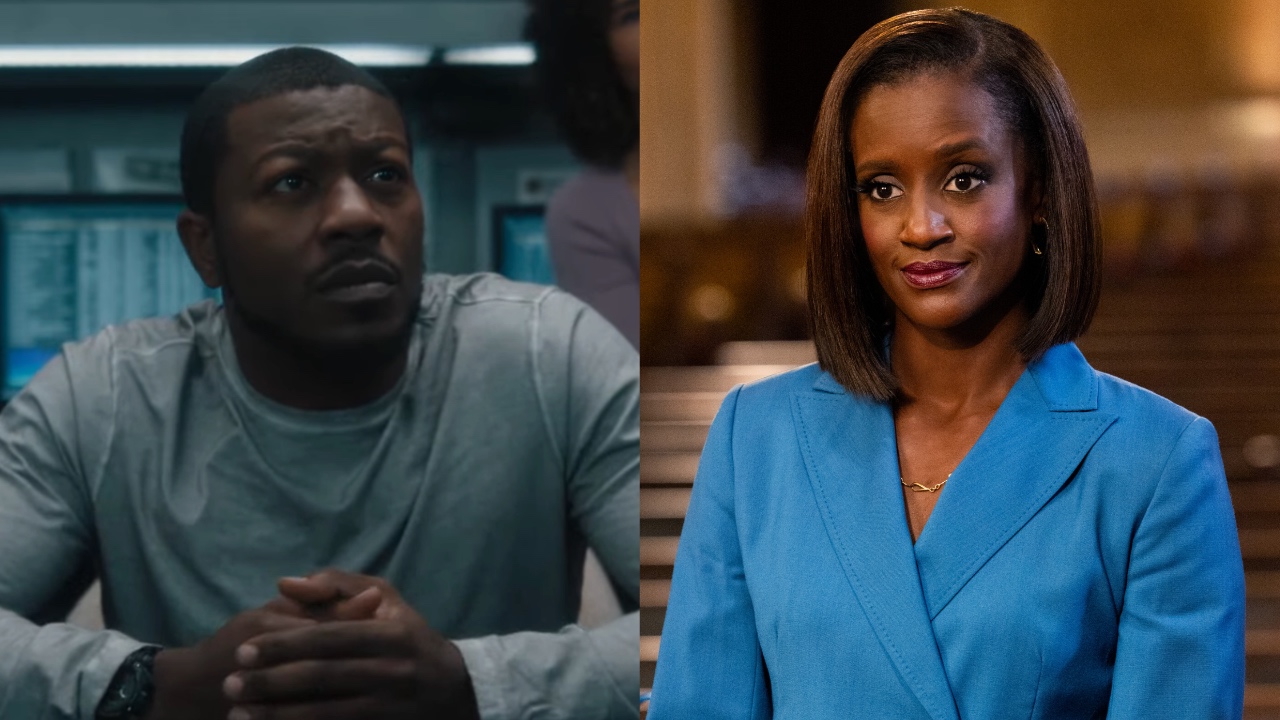When I saw Garden State in theaters, it instantly became my favorite (non-super hero story) movie of the year, a position it has held since then. I approached its DVD release with a bit of hesitancy. Was this film a fantastic, John Hughes of the new millennium, emotional type story as I remembered it, or had I built it up in my head as something greater than it was. Thankfully, what I remembered in my head still wasn’t as great as the experience of re-watching the movie and connecting with this great story written, directed, and starring Zach Braff. Garden State starts with its main character, Andrew Largeman (Zach Braff) waking to hear his father’s voice on his answering machine, letting him know Andrew’s mother has passed away. Largeman responds with little emotion, and continues through his day followed by a trip to his hometown in New Jersey and his mother’s funeral, all showing Largeman surrounded by a very surreal world. Like the news of his mother’s death, Largeman goes through the surreal world with little reaction to the events or oddities around him. It isn’t until later in the film that it’s revealed Largeman has been in a medicated state since he was ten, passing through life pretty much unaware and unfeeling.
This trip home for his mother’s funeral provides Largeman the opportunity to leave everything behind in L.A., including his medications. As his four-day trip home continues, Largeman starts to thaw from his emotionally frozen state, partially because of his detoxed condition, and also because of the introduction of a new girl - Sam (Natalie Portman). Sam is almost a polar opposite from Largeman’s frozen stoicism, a scattered pathological liar who holds some true wisdom beneath her somewhat flighty persona. Despite being so different, Largeman and Sam hit it off almost instantly, and over the next few days Largeman introduces Sam to the friends and life he left behind, particularly Mark (Peter Sarsgaard) whose life has taken him into the wonderful world of gravedigging. If Largeman and Sam are polar opposites, somehow Mark is the complete opposite of both of them. It’s a neat dynamic for the three characters, but nowhere near as interesting as the one between Largeman and his father (Ian Holm), two people who haven’t truly talked in almost twenty years, thrown together through a tragedy larger than the one that separated them.
As a writer, Zach Braff created some very deep and emotional characters. As a director he makes the smart move to let each actor completely own those characters, including himself. Braff, Sarsgaard, and Holm really become these characters in a theatrical way, as do other bit players throughout the movie. Natalie Portman, however, handles her role with a depth that hasn’t been shown with any of her other work, and the performance that results from that is her most incredible work thus far, blowing away even the esteemed, knighted Holm. Portman proves with Garden State that she deserves to have an acting career beyond Star Wars, especially in the hands of a capable director.
Garden State also succeeds in becoming a really deep story without being heavy handed. There’s some really great symbolism in the film if you want to look for it and if you don’t, eventually you get the meaning of the symbolism through the story. It’s rare for a movie to have so many memorable quotes and scenes you connect with these days, especially a film you connect with because it shows something that’s pretty real - this is life, it is troubled relationships and pain just as frequently and sometimes more than it is good times and parties with friends. Zach Braff gets that, and communicates it well through his first picture. I certainly hope his future endeavors are as consistently brilliant as this one is. The DVD release for Garden State offers more than you’d expect for a small film like this one. With two commentary tracks, over a dozen deleted scenes, and a “making of” video, this is a full DVD.
The problem is, this is also a movie that doesn’t necessarily need all of these things. It’s a movie with few special effects, and no real action sequences. It’s a heartfelt drama, more about characters and emotion than any kind of glitz or glamour. As such, the half hour “making of” featurette is a big drag. There’s really nothing exciting for the movie to cover, so it fills the time with stuff that’s not as interesting, such as working with a dog that has to hump Zach Braff’s leg, and the humane society representative’s take on that, or the creation of the arc for one of the film’s pivotal scenes. While I truly appreciate taking the opportunity to let some of the behind the scenes people get some recognition, I also truly believe the film should be the recognition here. The movie is a fantastic accomplishment that everyone involved with should be proud of, there shouldn’t be a need for a “behind the scenes” featurette to bring people into the spotlight. As an extra, this is one featurette that’s not bad, but just extraneous.
The deleted scenes are mostly longer versions of scenes that are in the movie, scenes that were cut down for good reason. The extra material just detracts from some of the symbolism or surreal moments of the movie. Only two scenes really stand out from the deleted scenes. The first is a long scene entitled “First Talk” which was a conversation between Largeman and his father much earlier in the movie. While it’s a good scene, I could definitely see why it was cut out - it added empathy for the father much too early in the film, which most likely would have robbed from Largeman and his father’s final conversation in the film. What is interesting of note is that this scene probably makes up over fifty percent of Ian Holm’s screen time. I think it’s an extremely brave move on Braff’s part to get such a big name actor as Holm, and then cut over half of the footage they filmed right out of the picture. It’s a true testament to Braff’s dedication to the story rather than cow towing to a big name. The second scene of note is an extended version of “Bathroom Talk”, an essential conversation between Largeman and Sam. While I love the scene from the movie, the extended scene really plays better and has even more emotional truth to it. It’s a shame this will only be seen as a deleted bit, and it's the most polished of the deleted scenes, making one believe it was probably one of the last things to be trimmed from the movie.
The two commentary tracks are better than I expected. While Braff has faced the circuit while promoting his film, his web presence has been sporadic on the site’s publicity “blog”, giving me the feeling Braff was more of a private person than I had thought him to be from interviews. Because of that I wasn’t expecting much from the tracks, one of which is him and Natalie Portman, and the other of him with Lawrence Sher (Director of Photography), Myron Kerstein (Editor), and Judy Becker (Production Designer). The Braff/Portman track is more of a everyman’s type track, where Braff talks lightly about the ideas behind the film, and Portman moves back and forth between talking about her work on the film and asking Braff questions to help spur the conversation forward. The second track is more detail oriented, getting into the real nuts and bolts of the creative process. Both tracks are fun to listen to, and Braff shows a real passion for his work regardless of talking big picture or getting into the details.
Your Daily Blend of Entertainment News
I’ve reviewed other DVD releases this year of first films from directors who went on to be big names. Braff’s directorial debut blows away the rest of the “big name” first films. I only hope his future allows him to become one of those big names, without losing his talent and honesty in storytelling. Garden State is an absolute must see, and most of you who see it will love it enough to pick this DVD up for your collection.

